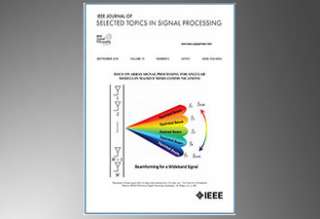SPS Feed
Top Reasons to Join SPS Today!
1. IEEE Signal Processing Magazine
2. Signal Processing Digital Library*
3. Inside Signal Processing Newsletter
4. SPS Resource Center
5. Career advancement & recognition
6. Discounts on conferences and publications
7. Professional networking
8. Communities for students, young professionals, and women
9. Volunteer opportunities
10. Coming soon! PDH/CEU credits
Click here to learn more.
The Latest News, Articles, and Events in Signal Processing

The Department of Electrical Engineering at Stanford University (http://ee.stanford.edu/) invites applications for a tenure-track faculty appointment at the junior level (Assistant or untenured Associate Professor) in the broadly defined field of electrical and computer engineering. Priority will be given to the overall originality and promise of the candidate’s work over any specific area of specialization.
Manuscript Due: June 13, 2022
Publication Date: March 2023
CFP Document

PostDoc and visiting PhD Positions Available at USC: Wireless Channel Measurement and High-Resolution Evaluation
May 22-23, 2022
Location: Singapore

A 3-year PhD scholarship is available at the Center for Fast Ultrasound Imaging (CFU), Department of Health Technology (DTU Health Tech) from December 2021 sponsored by the European Research Council (ERC) and the Department of Health Technology at DTU.

A 3-year PhD scholarship is available at the Center for Fast Ultrasound Imaging (CFU), Department of Health Technology (DTU Heath Tech) from December 2021 sponsored by the European Research Council (ERC) and the Department of Health Technology at DTU.
May 22-27, 2022
Location: Singapore
May 4-6, 2022
Location: Milan, Italy
October 19-21, 2021
Location: Coimbra, Portugal

Inviting applications for a rolling Ph.D. admission at Indraprastha Institute of Information Technology-Delhi (IIIT-D) on project areas in biomedical signal and image processing including cancer imaging, cancer genomics, and EEG/ECG signal processing.
No. of openings: Two
Monthly Remunerations: Rs. 31,000/- (+HRA will be provided if you are not residing on the IIITD campus)
Lecture Date: December 8, 2021 -- Virtual Lecture
Chapter: Meghnad Saha Institute of Technology IEEE SPS Student Branch Chapter
Chapter Chair: Wolfgang Utschick
Topic: New Sparse Sampling Methods: Time-based sampling and sampling along trajectories
Pages
SPS Social Media
- IEEE SPS Facebook Page https://www.facebook.com/ieeeSPS
- IEEE SPS X Page https://x.com/IEEEsps
- IEEE SPS Instagram Page https://www.instagram.com/ieeesps/?hl=en
- IEEE SPS LinkedIn Page https://www.linkedin.com/company/ieeesps/
- IEEE SPS YouTube Channel https://www.youtube.com/ieeeSPS




















